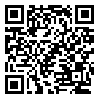BibTeX | RIS | EndNote | Medlars | ProCite | Reference Manager | RefWorks
Send citation to:
URL: http://mjiri.iums.ac.ir/article-1-291-en.html
Abstract
Background: The process of medical education is stressful and medical students are at risk of psychological problems. In addition to the normal stressors of everyday life, medical students must deal with stresses specific to medical school. The aim of this study was to assess mental health in senior medical students and residents.
Methods: This cross-sectional study included 100 senior medical students and 100 residents of Iran University of Medical Sciences, Tehran, between October and December of 2006. The measurement method was the SCL-90-R questionnaire. Respondents rate 90 items using a 5-point scale to measure the extent to which they have experienced the listed symptoms during the last 7 days. In this study we only reported GSI and raw scores of SCL-90-R subscales. We used the cut off point of 0.7 for GSI. All statistical analyses were carried out by using SPSS for Windows 14. Asignificant level was considered as 5%.
Results: The mean and standard deviation of GSI was 0.55. Overall 19.4% of participants had GSI more than 0.7, as suspected mental illness. 26% of residents compared to 12% of senior medical students scored higher than 0.7 on GSI with significant difference. 13% (11 subjects) of males compared to 24% (27 subjects) of female had GSI more than 0.7. This difference was significant (P= 0.05). 11.3% of participants with a good economic status versus 56% of those with weak status in economy scored GSI of more than 0.7 with significant difference (P = 0.006). The majority of participants (91%) with a good overall satisfaction scored less than 0.7 on GSI. This proportion between weak categories of overall satisfaction was 66%. There were significant differences between the two groups in the SOM, OBS, INT, DEP, ANX, PHO, and psychoticism subscales.
Conclusion: About one-fifth of participants are suspected cases of mental disorder. Residents scored significantly higher than senior medical students on all subscales (except HOS and PAR) of SCL-90-R and GSI score. The GSI score was associated with overall satisfaction, gender, satisfaction of the studying major and economic status of participants.
| Rights and permissions | |
 |
This work is licensed under a Creative Commons Attribution-NonCommercial 4.0 International License. |





